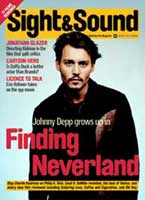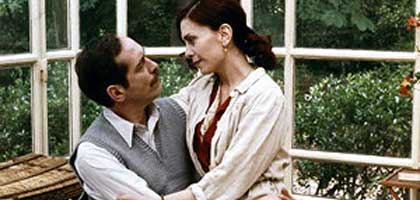
Painting from nature
Film of the Month: Triple Agent

Eric Rohmer's spy story Triple Agent is really about the mysteries of human motivation and the secrets of language, says Ginette Vincendeau
Eric Rohmer's twenty-second feature forms part of his historical series, a minority strand in a long filmography dominated by contemporary comedies of manners: the 'Moral Tales' of the 1960s and 1970s, the 'Comedies and Proverbs' of the 1980s, the 'Tales of the Four Seasons' of the 1990s. His Die Marquise von O (1976), from the German author Heinrich von Kleist, and the medieval tale Perceval Le Gallois (1979) were marginal, distant stories both historically and geographically; the popular L'Anglaise et le Duc (2001), set during the French Revolution, moved closer to contemporary French concerns. With Triple Agent Rohmer draws nearer still: to the complex years of the Popular Front of 1936-7 and World War II. Like L'Anglaise et le Duc, Triple Agent remains on the periphery of the momentous events it evokes, and opts - almost perversely - to take a counter-view of those on the 'wrong' side: in L'Anglaise et le Duc a Royalist English woman, in Triple Agent a White Russian émigré.
Fiodor Vorodin (Serge Renko), a former general in the Tsar's army, works for the Russian Army Veterans' Federation, headed by General Dobrinsky (Dimitri Rafalsky), whose authority Fiodor begins to question. Fiodor and his Greek artist wife Arsinoé (Katerina Didaskalou) seem a loving couple, but he nevertheless keeps her (and us) in the dark about his activities. Does he betray his White Russian employers and work for the Communists and/or the Nazis? What is his involvement in the kidnapping of Dobrinsky by Soviet officers disguised as Germans?
We will never know the answers - not least because the real case on which Rohmer based his script was never fully resolved. But this also enables the director to explore a theme common to all his films: the opaqueness of human motivations. Rohmer's cinema always revolves around a fateful misunderstanding, a flawed interpretation of evidence, usually relating to a love triangle: someone sees the wrong man or woman and draws the wrong conclusion. Here he elevates the device to shape the entire movie.
Fiodor parades the truth so as to lie more convincingly. The film stages several conversations where characters ask him questions about the international situation or the Soviet Union; he always answers obligingly but often contradictorily, his flow of information confusing his listener as well as the audience. Yet in retrospect - in particular in relation to the possibility of a rapprochement between Stalin and Hitler - we recognise that he is speaking the truth, but a truth so fantastic we assume it must be false. Ever the secret agent, he insists, "I never cite my sources. I pull strings behind the scenes" - a modus operandi that applies equally well to the director of the film. What Fiodor does during the crucial 'missing' hour while his wife is at the dressmaker - as well as his eventual fate - remain mysteries Rohmer refuses to clear up: "It's good for there to be no clear solutions to the questions being posed. It's much more interesting." So Triple Agent is all plot (or plotting) and no resolution, though this by no means diminishes its satisfaction.
Triple Agent is a spy story in which we see no spying. The flat below the Russian Army Veterans' Federation office is revealed to be a Soviet spy hideout only at the very end of the film, and in keeping its purpose hidden throughout the director keeps his audience in the dark just as Fiodor does the characters in the fiction. However, if Triple Agent doesn't offer traditional spy-story thrills, it certainly delivers the pleasures we expect from Rohmer: cruel moral dilemmas, sophisticated settings and the unparalleled use of language as the main constituent in the drama.
The moral dilemmas here are particularly painful. The charming Fiodor loves his wife yet subjects her to public humiliation (she learns about rumours that he's a spy from her friend Maguy). Maguy (played by the excellent Cyrielle Clair) is dressed in the latest Paris fashions in comparison with the relatively frumpish Arsinoé, she and her husband Boris are wealthier than the other couple, Maguy knows more about what Fiodor gets up to than his wife does, and she speaks French as her mother tongue, putting Arsinoé at a considerable disadvantage. That Fiodor hides the truth from his wife also forces her to lie for him and eventually - if indirectly - leads to her tragic fate: imprisonment and death in jail.
In terms of language, Triple Agent - which Rohmer claims is "the film of mine where people speak most" - sparkles with polished dialogue (the director bent historical accuracy to make Fiodor's wife Greek rather than Russian so they can plausibly talk French together). Rohmer's choice of non-French actors for his two lead roles - Renko is French of Ukrainian origin, Didaskalou is Greek - may seem odd, and indeed on first viewing Renko's performance appears flat and Didaskalou's hesitant. Yet Renko's subdued exterior fits perfectly with his triple life - it is crucial that he should appear bland - while Didaskalou's listless manner is appropriate for a woman who is ill and whose creativity is secondary to the narrative. Even the way the French actors pronounce certain words - for instance, 'fascism' - is (correctly) different from today's usage: language is thus a material component of the story, not just a vehicle; it is historical rather than a frivolous distraction from history.
History itself is merely suggested yet is ever-present: in the newsreels about the Popular Front, the Spanish Civil War and the 1937 Exhibition, in the use of Shostakovich's Communist song for the opening and closing credits, in the discussions between Fiodor and Arsinoé or Fiodor and Boris. While seemingly flirting or making light conversation, Fiodor discusses Stalinist purges and hints at the possibility of a Russian-German pact in the forthcoming war. The lost world of the Russian émigré community in France (princes turned taxi drivers, Russian restaurants and churches) is evoked through the use of existing 1920s blocks of flats and period clothes. Yet if Rohmer eschews the leftist stance of most French films about the period - Renoir's Le Crime de Monsieur Lange (1935), Duvivier's La Belle Equipe (1936), René Gilson's Ma blonde entends-tu dans la ville (1980) - he also avoids the fetishisation of 'retro fashion' movies such as Stavisky or La Banquière. Here the characters' knitwear looks home-made rather than unearthed from the props department.
Faithful to New Wave principles, Triple Agent is a reflection on both art and life. The discussions with neighbours Janine and André about painting (the French Communists love the abstraction hated by Stalin and Fiodor, who prefers the figurative pictures Arsinoé paints) demonstrate that art exists within a historical context but can also escape ideological interpretation. Arsinoé herself describes her highly codified 'genre scenes' as an attempt "to paint people in their natural environment" - and there could hardly be a better definition of Rohmer's cinema.
